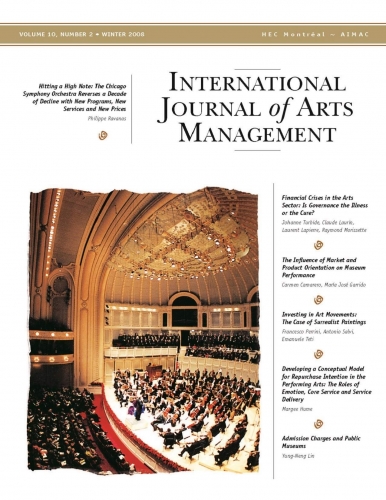Financial Crises in the Arts Sector: Is Governance the Illness or the Cure?
Produit: Article
21,00 $ CA
Johanne Turbide, Claude Laurin, Laurent Lapierre, Raymond Morissette
Johanne Turbide (PhD, University of Warwick, England) is professor of accounting at HEC Montréal Quebec, Canada, where she teaches financial management in the arts. She is the leading researcher for the project Financial Crises in the Arts Sector.
Claude Laurin (PhD, University of British Columbia, Canada) is professor of accounting at HEC Montréal, where he teaches undergraduate and graduate courses in management accounting and corporate governance. He has published extensively on public sector management and on corporate governance issues in European and North American journals.
Laurent Lapierre holds the Pierre Péladeau Chair in Leadership at HEC Montréal. He teaches courses on leadership, management of arts enterprises and cultural industries. His research interests include leadership and the influence of managers’ personalities on their management style and the role of management behaviour in an organization’s performance. He has served as editor of the journal Gestion: Revue internationale de gestion. He is a board member and an executive committee member of the Canada Council for the Arts.
Raymond Morissette (PhD, University of Waterloo, Ontario, Canada) is professor of accounting at HEC Montréal, where he teaches undergraduate and graduate courses in management accounting and auditing.
ABSTRACT
In the Canadian province of Quebec, tension between the artistic success and the financial health of notfor-profit arts and culture organizations is becoming increasingly apparent. In the past five years, several organizations that have been recognized worldwide for their artistic accomplishments have been struck by financial crises. The authors ask what role governance could play in resolving such crises. In this preliminary investigation, they propose a framework for analysing the strengths and weaknesses of the governance practices employed by notforprofit organizations in the arts and culture sector. The authors conclude by describing the research strategy that will be implemented in order to launch an empirical investigation based on their framework.
KEYWORDS
Governance, financial crises, conceptual framework
RÉSUMÉ
Dans la province de Québec, il semble qu’il soit difficile de remplir le mandat artistique d’un organisme artistique ou culturel sans mettre à risque la santé financière de ce dernier. Au cours des cinq dernières années, des organismes à but non lucratif du secteur des arts et de la culture de toutes tailles ont connu de graves problèmes financiers et ce, malgré une très bonne reconnaissance artistique. Dans cet article, nous nous interrogeons sur le rôle de la gouvernance dans un tel contexte. De fait, ce document de recherche constitue le premier volet d’un vaste programme de recherche dans lequel nous souhaitons bâtir un cadre de gouvernance adapté aux organismes artistiques et culturels, cadre qui pourrait permettre d’évaluer les forces et les faiblesses des pratiques de gouvernance de ce secteur. Nous terminons l’article en présentant notre stratégie de recherche empirique définie en trois temps.
MOTS CLÉS
Gouvernance, crises financières, cadre d’analyse
RESUMEN
En la provincia de Quebec cumplir con el mandato artístico de un ente artístico o cultural parece ser difícil sin poner en peligro la salud financiera del mismo. En los últimos cinco años las organizaciones sin fines de lucro en el campo de las artes y la cultura de todo tamaño han experimentado graves problemas financieros, a pesar de gozar de muy buena reputación artística. En el presente artículo nos interesamos sobre el papel que desempeña la gobernanza en este contexto, de hecho, este documento investigativo constituye la primera parte de un amplio programa de investigación con el cual deseamos construir un marco de gobernanza adaptado a las organizaciones artísticas y culturales que permita evaluar las fuerzas y debilidades de las prácticas en materia de gobernanza de este sector. Terminamos el artículo presentando nuestra estrategia de investigación empírica definida en tres etapas.
PALABRAS CLAVE
Gobernanza, crisis financieras, marco analítico

